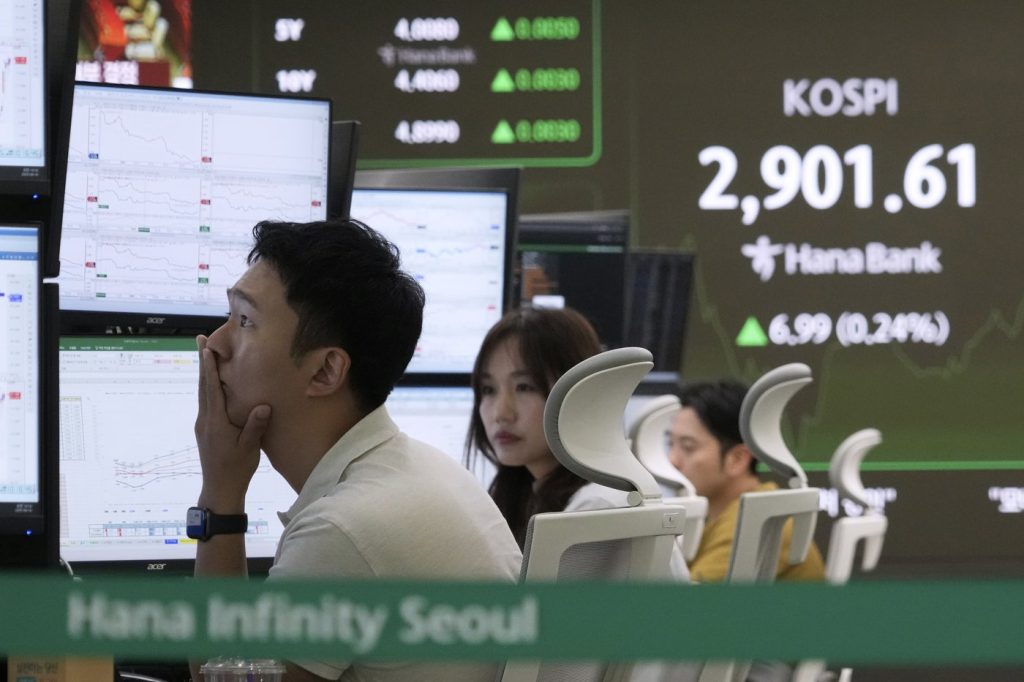HONG KONG (AP) – On Monday, Asian shares showed a mixed performance as oil prices continued to climb due to concerns about escalating tensions between Iran and Israel, which could potentially disrupt global crude supply. U.S. benchmark crude oil recorded a modest increase of 20 cents, reaching $73.18 per barrel, while Brent crude, the international benchmark, rose by 95 cents to $75.18 per barrel.
In the stock market, Tokyo's Nikkei 225 saw an increase of 1.3%, closing at 38,307.74. Similarly, South Korea's Kospi gained 0.9%, settling at 2,920.57. In contrast, Chinese markets experienced little change following the release of May's economic data that reflected stronger consumer spending but weaker factory activity and investment. Retail sales jumped by 6.1% year-on-year; however, industrial output growth was below expectations, increasing by only 5.8% compared to the previous year.
In Hong Kong, the Hang Seng Index slightly declined by 0.1% to 23,864.20, while the Shanghai Composite Index edged up by less than 0.1% to 3,378.78. Australia's S&P/ASX 200 also fell, decreasing by 0.2% to 8,547.40.
The previous Friday was marked by a surge in oil prices and a notable drop in stock indices after Israel launched an attack on Iranian nuclear and military targets. The S&P 500 fell by 1.1% to 5,976.97, while the Dow Jones Industrial Average declined by 1.8% to 42,197.79. The Nasdaq composite also saw a loss, decreasing by 1.3% to 19,406.83. In the oil market, prices rose significantly, with benchmark U.S. crude and Brent crude both increasing by more than 7%.
Iran, a significant player in the global oil market, has faced restrictions from Western sanctions, which have limited its oil exports. Escalation of conflict in the region could further tighten oil supplies, leading to increased prices across the globe. Additionally, there are fears about potential disruptions in the Strait of Hormuz, a crucial waterway through which a large portion of the world’s oil is transported by tanker.
Companies heavily reliant on fuel and customer travel experienced sharp losses; for instance, cruise operator Carnival fell by 4.9%, United Airlines dropped by 4.4%, and Norwegian Cruise Line Holdings decreased by 5%. These losses overshadowed gains for U.S. oil producers benefiting from rising oil prices; Exxon Mobil saw a rise of 2.2%, and ConocoPhillips increased by 2.4% due to the anticipation of higher profits from the increased crude prices. Defense contractors also performed well, with Lockheed Martin, Northrop Grumman, and RTX each rising more than 3%.
In precious metals, the price of gold increased as investors sought safe-haven assets, with an ounce adding 1.4% on Friday and maintaining its value in early trading on Monday. Meanwhile, U.S. Treasury bond prices fell on Friday, pushing yields higher amid concerns that rising oil prices could exacerbate inflation. Although inflation has remained relatively stable, with recent figures close to the Federal Reserve's target of 2%, there is significant worry about an impending acceleration, partly fueled by tariffs imposed by President Donald Trump.
A positive sentiment report released on Friday from the University of Michigan indicated improved consumer sentiment for the first time in six months, contributing to the rise in yields as expectations for future inflation eased. Despite reporting stronger-than-expected earnings, Adobe shares fell by 5.3%, as analysts noted that investors were anticipating a more significant revenue forecast for the upcoming year.
In currency markets, the U.S. dollar strengthened against the Japanese yen, rising to 144.37 from 144.03 yen, while the euro appreciated slightly against the dollar, moving to $1.1537 from $1.1533.











